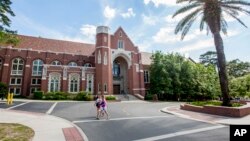New U.S. regulations aimed at protecting college students give American colleges and universities increased responsibility for ending sexual assaults on campus.
The measures, provisions of the the Violence Against Women Reauthorization Act of 2013, took effect July 1 and call for educational institutions to take a more direct role in protecting female students.
Universities now must follow stricter reporting requirements for sexual assault allegations and must provide clear options to those who report an incident of suspected abuse. They must also provide prevention training for students and college employees.
The new regulations come in effect following several studies and polls showing a problem with the rate of sexual assaults on American college campuses.
A poll released by The Washington Post and the Kaiser Family Foundation last month showed that 20 percent of female college students and five percent of males were the victims of sexual assaults on U.S. campuses during the past four years. The survey contacted more than 1,000 people who attended college and lived on or near the campuses of more than 500 colleges and universities across the country.
Tracy Sefl, a board member of the Rape, Abuse & Incest National Network, the largest anti-sexual violence organization in the United States, said, "increased awareness has led to increased recognition of a problem.”
The Post/Kaiser survey indicated that nearly three-quarters of campus sexual-assault victims spoke to others about the incidents, but only 12 percent reported the attacks to police or their colleges.
Why the silence?
Dana Bolger is a co-founder of Know Your IX, whose name refers to Title IX, a group of U.S. laws prohibiting discrimination and guaranteeing equal opportunity for all in educational institutions that receive federal funds. Her organization educates and provides aid to students on matters involving sexual assaults. Bolger, who is a sexual assault survivor herself, said there are many reasons that survivors choose not to report incidents.
“We know that most victims were assaulted by a friend or partner, and there can be a lot of confusion and doubt that comes along with that experience, and hesitation to report [someone] whom you know or love,” she said.
Although four times as many women as men suffer sexual assaults during their studies, Tracy Sefl said, "The rates in many ways don’t matter, because the outcome and the risks and the long-term effects are very equal in many ways."
The survey reports that two-thirds of assault victims had been drinking alcohol at the time, and that 77 percent of the survey respondents believe a reduction in drinking will help prevent campus sexual assaults.
However, Katherine Bowman, a victim of sexual assault while she was attending college, disagrees.
“We all put ourselves at risk of being in a car accident every time we get in a car, but if someone runs a red light and hits you, it's not your fault,” she said. “We don't blame people [and say], ‘Well, you shouldn’t be driving. You put yourself to risk.’ Why should we do the same to the [assault] survivors?"
Controversial cases
In May 2014, the U.S. Department of Education released a list of 55 universities and colleges under investigation for mishandling sexual assaults. They include some of the most elite universities in the U.S., including the Ivy League's Harvard University, Princeton University and Dartmouth College. So far, the U.S. federal government is investigating 130 cases of sexual assault on campuses, involving 117 schools.
But many cases have generated controversy for the way schools and the media have handled sexual assault allegations.
In December 2014, Rolling Stone magazine published a lengthy article, “A Rape on Campus,” about an alleged gang-rape of a University of Virginia female student by members of the school's Phi Kappa Psi fraternity. The accuser's account ultimately was found to be untrue, and the magazine retracted its article, but the fraternity and a university administrator filed suit seeking damages.
Since 2011, in fact, more than 30 male students have sued their schools after being found responsible for sexual misconduct. Most have alleged they were denied due process or a fair hearing of the allegations against them.




